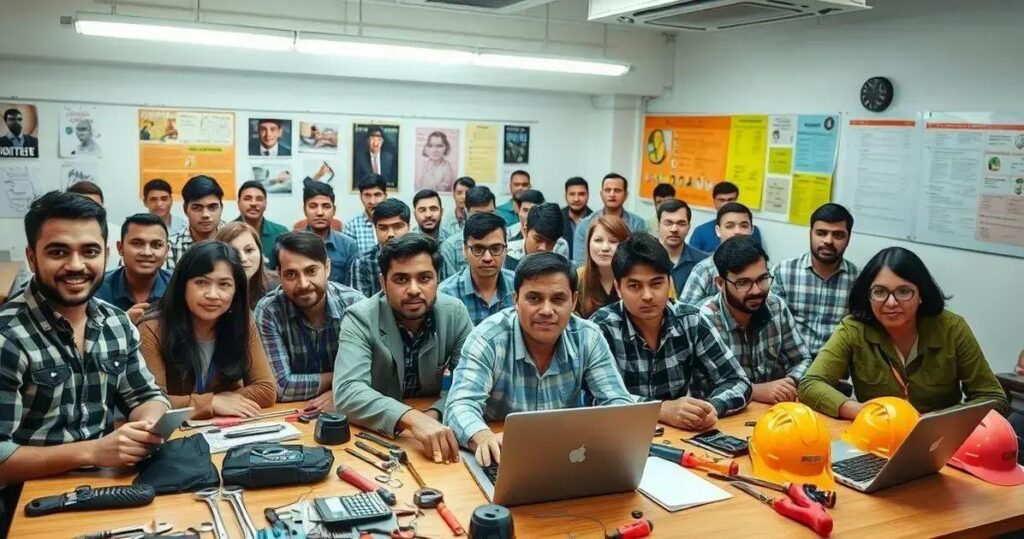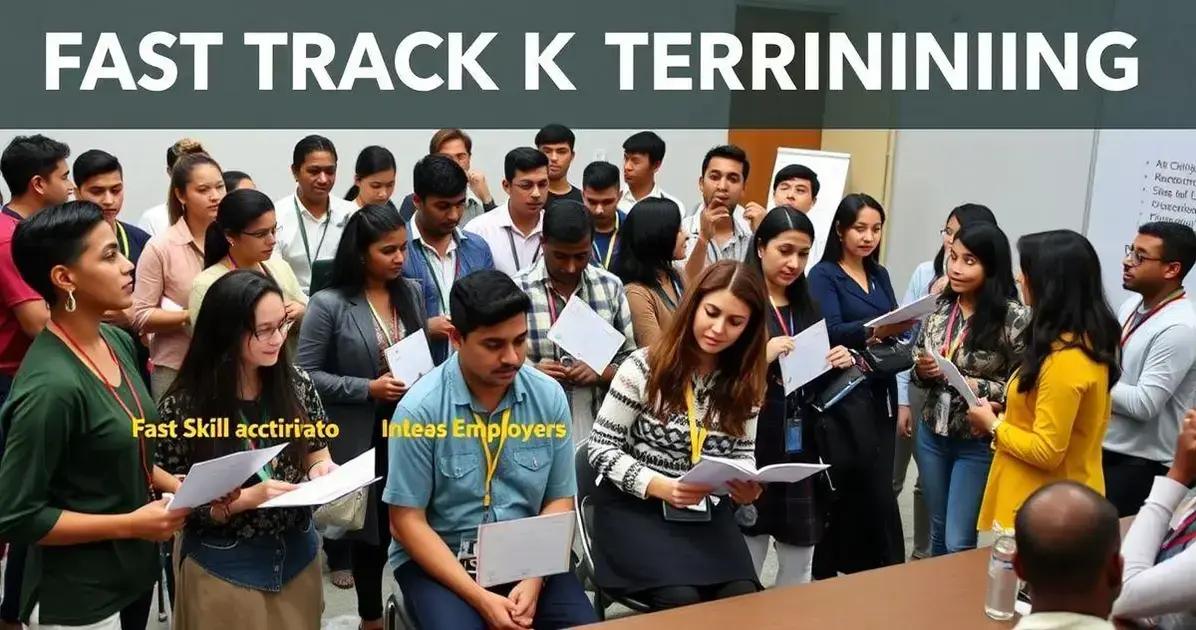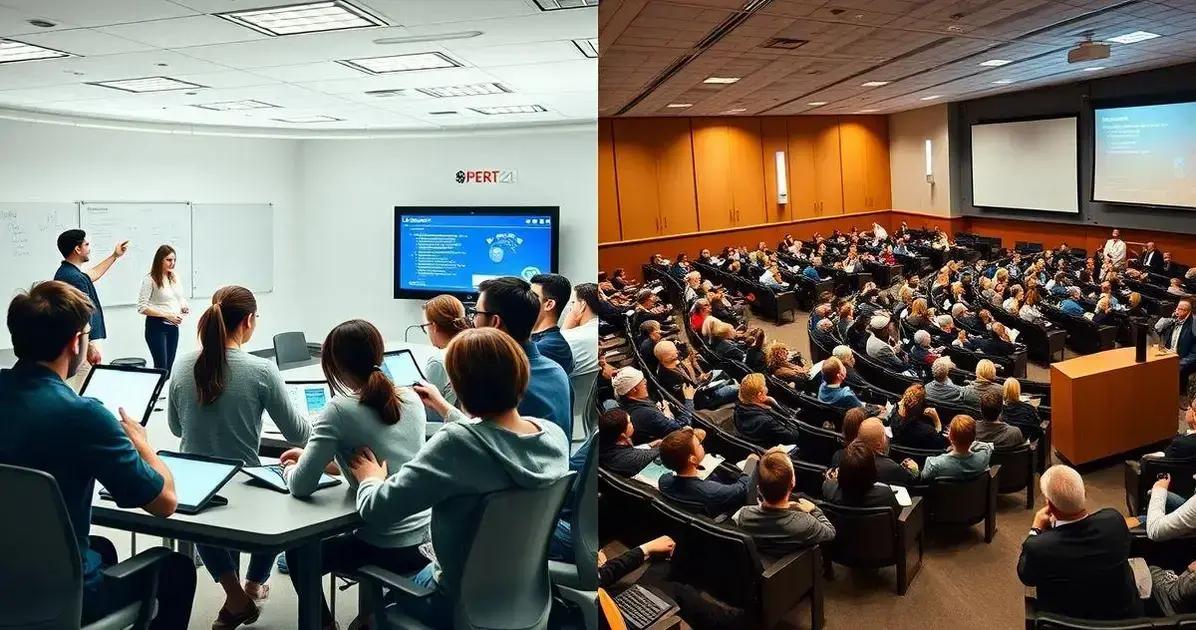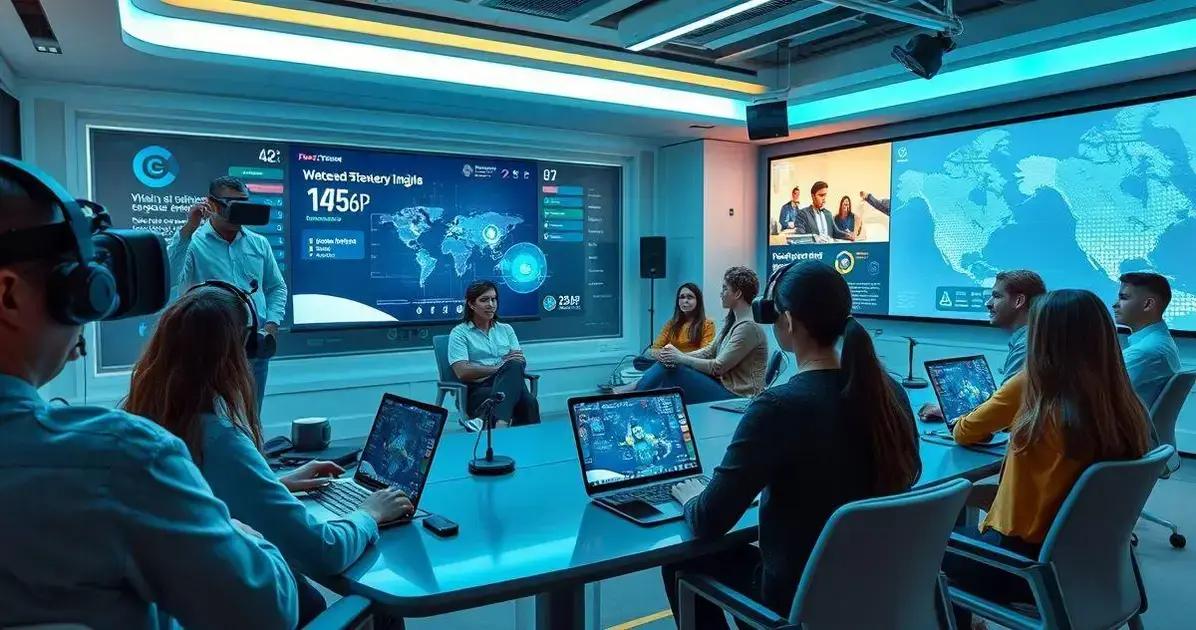Fast Track Job Training: Unlock Your Career Potential in Months

Anúncios
Are you ready to advance your career with **fast track job training**? This approach accelerates your learning and places you directly into the workforce, saving time and resources compared to traditional education paths. Discover how this innovative training can open new doors to your dream job and enhance your professional journey.
What is Fast Track Job Training?
Fast track job training is a specialized educational approach designed to provide individuals with critical skills and knowledge in a short timeframe. This type of training is typically targeted at those looking to enter the workforce swiftly or change careers. In contrast to traditional education, which often spans years, fast track programs can be completed in a matter of weeks or months.
How Fast Track Job Training Works
These programs focus on key practical skills relevant to specific industries, allowing participants to dive into learning that’s applicable in real-world settings. By focusing on essential topics, students gain the expertise needed to excel in their chosen fields, whether it’s healthcare, technology, or trades.
Diverse Opportunities
Fast track job training offers pathways to employment for individuals from various backgrounds. These programs often partner with businesses to ensure their curricula align with industry demands. This connection not only aids in securing jobs post-training but also keeps the curriculum current and widely adopted.
The flexibility of these programs makes them particularly appealing to those who need to balance other life commitments or want to minimize training time. Whether online or in-person, many fast track courses offer convenient schedules that support diverse learning needs.
Through a combination of lectures, hands-on practice, and business engagements, participants leave prepared to meet and exceed career expectations, paving the way for a successful professional future.
Benefits of Fast Track Job Training Programs

Fast track job training programs are designed to provide significant advantages to those looking to enhance their career prospects swiftly. One of the major benefits is the accelerated learning process. These programs are specifically tailored to cover vital industry skills in a condensed timeframe, which means participants can start working sooner than those in traditional education settings.
Cost-Effective Solution
Another key advantage is cost savings. With shorter courses, individuals often pay less in tuition fees, and many programs offer flexible payment options or financial aid. This affordability makes it easier for more people to access quality education without accruing massive debt.
Increased Job Opportunities
Fast track programs often have partnerships with local businesses and industries. This network can help graduates secure employment quickly after completing their training. The skills taught in these programs are in demand, and the focused nature of the training means competencies are directly applicable to real-world jobs.
The flexibility of many fast track programs is also a significant benefit. Whether delivered online, in-person, or through a hybrid model, these courses can fit into the busy lives of working adults or those with family responsibilities, ensuring education is accessible to a broader audience.
Additionally, fast track job training facilitates career transitions. Individuals looking to pivot professionally can gain the necessary skills without the time commitment associated with earning a new degree, thus enabling swift entry into a new field.
How to Choose the Right Training Program for You
Choosing the right training program can be a crucial step in your professional journey. Start by evaluating your career goals. Determine what skills you need and where you envision your career heading. This clarity will guide you in selecting a program that aligns with your ambitions.
Assess the Curriculum
Examine the program’s curriculum to ensure it covers the essential topics for your desired field. A comprehensive program should offer a balance of theory and practical skills. This balance will help you apply what you learn immediately in a work setting.
Research Accreditation
Make sure the program is recognized and accredited by relevant industry bodies. Accreditation often signifies quality and ensures the training you receive is up-to-date with industry standards. This recognition can also enhance your resume and employability.
Consider the format of the program, whether it’s online, in-person, or a blend of both. Choose one that fits your schedule and learning style. Flexibility is crucial, especially if you have other commitments such as a job or family obligations.
Finally, inquire about job placement services. Some programs offer support to help you find a job post-completion. This service can be a valuable asset, providing you with connections and opportunities within your field.
Fast Track Job Training vs. Traditional Education

When deciding between fast track job training and traditional education, it’s essential to consider their differences. Fast track programs are designed for quick entry into the workforce. They focus on essential skills and can often be completed in a matter of months, whereas traditional education like a bachelor’s degree typically takes years.
Cost Differences
Fast track programs are generally more affordable than traditional education. They have lower tuition fees and shorter durations, which can reduce overall education costs. In contrast, traditional education may offer a broader range of knowledge but often comes with higher expenses.
Flexibility and Accessibility
Fast track programs often offer flexible schedules, allowing students to balance other life responsibilities. Many provide online or hybrid options, catering to diverse learning preferences. Traditional education usually follows a more rigid schedule, which might not suit everyone.
Practical skills are a hallmark of fast track training. These programs are developed with industry needs in mind, ensuring that graduates are ready for immediate employment. However, traditional education can offer a deeper academic foundation, which is beneficial for certain professions that require extensive theoretical knowledge.
While a traditional degree might open the door to a wider range of jobs, fast track job training provides a targeted approach to specific careers, making it ideal for those who know their desired career path and want to enter the field swiftly.
Success Stories: Transformations Through Fast Track Job Training
Fast track job training has transformed countless lives by offering rapid career advancements and new opportunities. Take Sarah, for example, who transitioned from retail to healthcare within months. With targeted training, she quickly acquired the necessary skills to become a licensed medical assistant, significantly improving her career prospects and earning potential.
From Zero to IT Professional
Another success story is John’s journey into the tech world. Previously a construction worker, John enrolled in a fast track coding bootcamp. The intensive program provided him with hands-on experience and industry insights, enabling him to secure a position as a software developer. His life was transformed through the strategic acquisition of digital skills.
Reinventing Mid-Career
Melissa exemplifies the power of fast track training for mid-career professionals. After years in accounting, she embraced change and pursued culinary arts through a fast track program. The training equipped her with chef skills, allowing Melissa to open her own successful restaurant, turning a passion into a thriving business.
Fast track job training has also empowered veterans like David to transition to civilian careers. With focused training in cybersecurity, David leveraged his military experience and new skills to join a leading tech firm, fulfilling a critical role in protecting data.
These stories highlight the life-changing impacts of fast track job training. By meeting industry needs and bridging skills gaps, these programs enable individuals to pursue their dream careers and unlock their full potential.
Future Trends in Fast Track Job Training

The landscape of fast track job training is evolving rapidly, driven by technological advancements and shifting workforce demands. One emerging trend is the integration of virtual reality (VR) and augmented reality (AR) into training modules. These technologies create immersive learning experiences, enabling learners to practice real-world skills in simulated environments.
Increased Emphasis on Lifelong Learning
As industries continue to evolve, there is a growing need for lifelong learning. Fast track job training programs are beginning to emphasize continuous education, offering modular courses that allow professionals to update their skills regularly. This approach helps individuals remain competitive and adaptable in their careers.
Personalization through AI
With the rise of Artificial Intelligence (AI), training programs are becoming more personalized. AI can assess an individual’s learning pace and style, providing tailored content that maximizes retention and efficiency. This customized approach helps learners grasp complex concepts quickly.
Remote learning is also gaining traction. The flexibility and accessibility of online platforms make it possible for people to receive training from anywhere in the world. This trend is democratizing education, allowing more people to benefit from high-quality fast track programs without geographical constraints.
The collaboration between educational institutions and industries is expected to strengthen. This partnership ensures that curricula remain relevant and aligned with current market needs, providing learners with skills that are directly applicable to their careers.
Unlocking Your Career Potential with Fast Track Job Training
Fast track job training is an effective and dynamic approach to career development, providing rapid skill acquisition and enhancing employability in various industries. By offering accelerated, cost-effective, and flexible learning options, these programs are transforming education and helping individuals achieve their career goals swiftly.
As industries continue to evolve, fast track programs are adopting innovative methods such as VR, AR, and AI to deliver cutting-edge training. This evolution ensures that learners are equipped with the latest skills demanded by the marketplace, setting them on a path to success.
With tangible success stories and promising future trends, fast track job training is an invaluable asset for anyone looking to redefine their professional journey. Embrace these opportunities to unlock your career potential and embark on a path of growth and excellence.